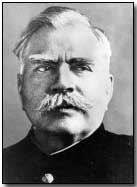Primary Documents - Joseph Joffre on the Battle of Verdun, 3 August 1916
 Reproduced below is French
Army Commander-in-Chief
Joseph Joffre's summary of the German offensive
launched
against French-held Verdun on 21 February 1916.
Reproduced below is French
Army Commander-in-Chief
Joseph Joffre's summary of the German offensive
launched
against French-held Verdun on 21 February 1916.
Often described as the greatest battle of the war, casualties on both sides were immense. German Army Chief of Staff Erich von Falkenhayn's stated intention was to "bleed France white" in the latter's defence of Verdun.
Such virtually proved to be the case - although the scale of German losses brought Falkenhayn much criticism. Indeed the failure to capture Verdun ultimately resulted in Falkenhayn's removal as Chief of Staff and Paul von Hindenburg's installation (along with Erich Ludendorff). The Crown Prince was himself subsequently described as "the butcher of Verdun" for his role in the battle.
In his official statement (below) Joffre suggested that Germany was exhausting all of its manpower reserves and that defeat could not be staved off indefinitely. At the same however he argued that it was not possible to predict when the Verdun offensive would end.
Click here to read Falkenhayn's justification for the offensive. Click here to read Crown Prince Wilhelm's summary of the battle. Click here to read Wilhelm's summary of its abandonment. Click here to read von Hindenburg's decision to call off the offensive. Click here to read Erich Ludendorff's dismissive view of the battle. Click here to read British newspaper baron Lord Northcliffe's despatch during the early days of the battle. Click here to read a French memoir of the German attack on Le Mort Homme in May 1916. Click here for a memoir of the struggle for Fort Douaumont the same month. Click here for a memoir of the German assault upon Fort Vaux in June 1916. Click here to read General Millerand's official account of the see-saw fighting at Thiaumont in July and August 1916. Click here to read a semi-official German historian's account of the end of the battle. Click here to read General von Zwehl's memorandum issued immediately before the French recapture of Forts Vaux and Douaumont. Click here to read Ludendorff's statement regarding the loss of Forts Vaux and Douaumont. Click here to read French General Pierre Dubois's view of the German approach at Verdun. Click here to read a French staff officer's account of the recapture of Fort Douaumont in October 1916.
Official Announcement by Joseph Joffre, 3 August 1916
The great sacrifices which France has supported at Verdun have given our Allies time to build up their resources, have enabled us to mature our plans and carry them out with perfect appreciation of the necessities of all fronts.
We are now able to employ all our resources simultaneously in a thoroughgoing way. I desire to pay homage to the manner wherein all the Allies are fulfilling their part.
Drawing on her inexhaustible resources Russia has been afforded time to bring forward men in ever-increasing numbers, and is now deploying her huge armies with telling effect in Galicia, Volhynia, and Armenia.
Great Britain, too, has had time in the past two years to show the world the extent of her varied resources. Her troops are proving their splendid valour on the Somme, showing what a determined nation can do in such times as these.
No doubt Italy has a difficult and limited part to play in a more restricted sphere of action, but her troops are fulfilling their role splendidly.
The Serbian army is beginning at this moment to enter the firing-line anew.
We know positively that our enemies, although fighting as desperately as ever, are drawing on their last reserves. Up to now they have followed the policy of transferring their reserves from one place to another, but in face of the Allies' united effort they now find it impossible, and will find it increasingly impossible in future, to pursue such methods. All our sources of information confirm that.
It is not for me to say how long this struggle is going to last, but the question matters little. We know that the rupture is coming. You, no doubt, feel as well as we do, that we have reached the turning point.
The five months' resistance of the French troops at Verdun has shattered the plans of the German Staff, and brought us round the corner, heading for victory. Don't, however, imagine that there is yet a marked weakening of the German effort on the western front. Two-thirds of their finest troops are still opposed to us on this side. The English and French face 122 of their best divisions. On the Russian front the Germans have 50 divisions to which must, of course, be added the Austrian armies.
I won't go into details on the condition and temper of the French army. You cannot do better than avail yourself of the facilities to see our troops in the field with your own eyes. You will see the army as it is after two years of the hardest fighting. You will see an army of which the spirit and energy have been vastly increased by this bitter struggle.
To that I can add that the number of our troops at the front is greater now than at the beginning of the war. I can think of no more eloquent fact than that as illustrating France's capacity for waging a just war. The country is determined to see the war to a victorious conclusion. The Allies are fighting not merely for the respective interests of their countries, but for the liberty of the world, and will not stop till the world's liberty is definitely assured.
Source: Source Records of the Great War, Vol. IV, ed. Charles F. Horne, National Alumni 1923
A 'Baby's Head' was a meat pudding which comprised part of the British Army field ration.
- Did you know?
